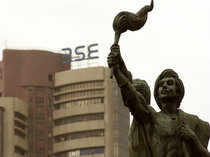
While most analysts expect the pay bonanza to revive consumer demand and aid economic recovery amid a lacklustre investment environment and tepid corporate earnings, it has met with timid reaction from the Street.
The S&P BSE Sensex was up 160 points at 26,002 while the 50-stock baroemter Nifty50 traded higher by 48 points at 7,891.
For minute-by-minute market/stock updates, follow our Twitter handle @ETMarkets
As per the recommendations of the pay panel, over 4.7 million central government employees and 5.2 million pensioners will receive a 23.55 per cent hike in gross salaries from January 2016 onward. The rate of hike suggested is well below the 40 per cent increase given by the Sixth Pay Commission, but higher than the 16 per cent raise assumed in the medium-term expenditure framework statement of the finance ministry.
The recommendations, if accepted, can boost consumption growth. “In addition, the sentiment boost for over 15 million central and state-level employees and pensioners could lift private consumption growth from 6.3 per cent YoY in FY15 to approximately 8.4 per cent YoY in FY17,” Citi group said in a report.
One key fact to note here, according to the investment bank, is the lack of significant arrears receivables, which is a departure from previous Pay Commission recommendations.
Analysts on Dalal Street say the pay panel boost could be much less and may underwhelm investor expectations. “The impact on the broader economy from a consumption perspective will likely underwhelm investor expectations,” said Gautam Chhaochharia, ED & HoR (India), UBS.
Although, its role in reviving consumer spend remains crucial, global investors who keep a keen eye on the country’s fiscal deficit worry that it might make it difficult for the government to meet its fiscal deficit target next financial year.
The pay panel has estimated the government’s wage bill next year to increase by Rs 1.02 lakh crore, or 0.65 per cent of GDP. Of this, 0.45 per cent of GDP is estimated to be the increase in the wage/pension bill in the central budget, while the remaining 0.2 per cent of GDP will be the increased wage impact on the railway budget, a JP Morgan note said.
Since the pay panel recommendations will be implemented in 2016, JPMorgan sees no impact of the wage increase on the fiscal deficit this financial year.
“But, if the recommendations are broadly accepted as they are, and the wage bill does rises by 0.5 per cent of GDP next year, it will significantly increase the fiscal challenge that the government is already facing in the next financial year (2016-17),” it said.
The NDA government has a commitment to reduce fiscal deficit by 0.1 per cent of GDP this financial year and has benefited to a large extent from the incremental windfall on the oil bill, which is pegged at 0.5 per cent by JPMorgan. But if oil prices remain around current levels in 2016, there will be no windfall gains to offset the rise in expenditure.
Citi, too, sees the possibility that the government may find it hard to attain its fiscal deficit target in FY17. “Considering the rise in wage expenditure by 0.5 per cent of GDP next financial year and a likely reduction in corporate tax rate, the central government’s target to reduce fiscal deficit from 3.9 per cent of GDP in FY16 to 3.5 per cent in FY17 becomes more challenging,” it said.
Citi Bank fears that this might force the government to cut public expenditure, which has been a hallmark of its policy this year to revive the country’s sluggish economy.
Reducing the deficit while increasing wages and preserving public investment will not be trivial, and the government will truly have to walk a tightrope, JPM noted.
“The challenge before the authorities is to ensure that this consumption boost is not achieved at the altar of fiscal prudence or public investment spending," it said.
Gautam Chhaochharia says “either the execution of the recommendations will get delayed or its implementation will be staggered with a much lower hike.”
(What's moving Sensex and Nifty Track latest market news, stock tips, Budget 2024 and expert advice, on ETMarkets. Also, ETMarkets.com is now on Telegram. For fastest news alerts on financial markets, investment strategies and stocks alerts, subscribe to our Telegram feeds .)
Subscribe to The Economic Times Prime and read the Economic Times ePaper Online.and Sensex Today.
Top Trending Stocks: SBI Share Price, Axis Bank Share Price, HDFC Bank Share Price, Infosys Share Price, Wipro Share Price, NTPC Share Price
(What's moving Sensex and Nifty Track latest market news, stock tips, Budget 2024 and expert advice, on ETMarkets. Also, ETMarkets.com is now on Telegram. For fastest news alerts on financial markets, investment strategies and stocks alerts, subscribe to our Telegram feeds .)
Subscribe to The Economic Times Prime and read the Economic Times ePaper Online.and Sensex Today.
Top Trending Stocks: SBI Share Price, Axis Bank Share Price, HDFC Bank Share Price, Infosys Share Price, Wipro Share Price, NTPC Share Price










 Get Unlimited Access to The Economic Times
Get Unlimited Access to The Economic Times
